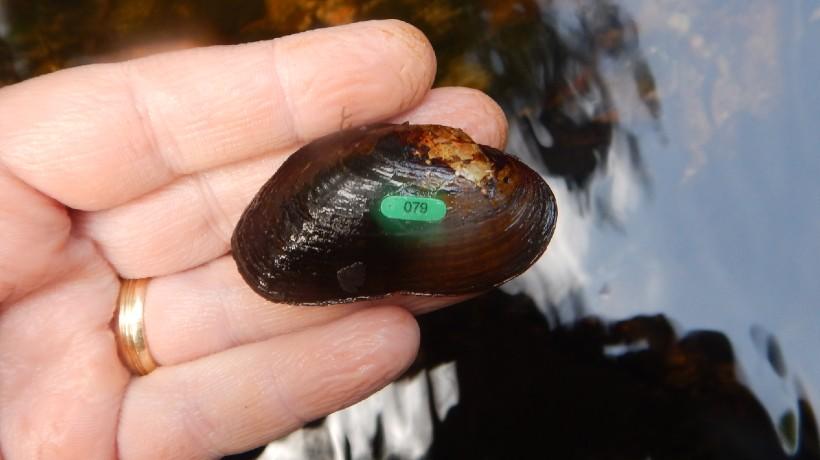MassWildlife’s Natural Heritage and Endangered Species Program conserves and protects the most vulnerable animal and plant species of Massachusetts and the habitats upon which they depend.
Description
Common name: Brook floater
Scientific name: Alasmidonta varicosa
Size: Three inches in length
Range: Atlantic States and Provinces from New Brunswick, Canada south to Georgia
MA conservation status: Endangered
Federal conservation status: Not listed (listing not warranted in 2019)
Fun facts
- Brook floater may live 15 or more years, which is pretty old for an invertebrate. Some of our other freshwater mussels in Massachusetts can live over 70 years!
- Freshwater mussels can have very interesting names. Brook floater are sometimes called “swollen wedgemussel”. Funny names of other freshwater mussels from other parts of the country include: “pocketbook”, “spectacle case”, “monkey face”, “sheepsnose”, “wartyback” and “orangefoot pimpleback”.
- Freshwater mussels are important to clean water and fish habitat. As filter feeders, they eat algae and bacteria in the water and clean our streams and ponds. They also provide structure the stream bottom or lakebed, improving habitat for other invertebrates and fish.
- Freshwater mussels have a unique life cycle. Mussel larvae (babies) undergo a metamorphosis as parasites on fish hosts. The fish are not hurt during the metamorphosis.
- Some mussel species are “host specialists” and only use one to a few types of fish host, others are “generalists” and use many different fish species as hosts. Brook floater use a handful of fishes as hosts, including brook trout, minnows, and some sunfish.
- Brook floater prefer medium sized streams with clear, cool, flowing water, and a streambed mixture of sand, cobble and boulders.
Threats and conservation
- More than 70% of freshwater mussels in North America are considered needing conservation efforts.
- Brook floaters are sensitive to stream fragmentation caused by dams as well as habitat degradation from pollution and development.
- Only four populations of brook floater remain in the Commonwealth.
- Brook floaters are listed as threatened or endangered by every state in which they occur. They are listed as endangered in Massachusetts.
- Since 2016, MassWildlife has been partnering with the US Fish & Wildlife Service and the University of Massachusetts, Amherst to research conservation needs of brook floater in Massachusetts. This research has resulted in a better understanding of host fishes and habitat used and identification of culture techniques for potential future reintroductions.
How you can help
- MassWildlife's Natural Heritage and Endangered Species Program (NHESP) is responsible for the conservation and protection of over 400 rare animals and plants, including the bald eagle. NHESP's work is primarily funded through grants and donations from supportive citizens. Donate to NHESP today at mass.gov/support-nhesp
-
MassWildlife's Natural Heritage and Endangered Species Program is responsible for the conservation and protection of over 400 rare animals and plants, including brook floaters. This work is primarily funded through grants and donations from supportive citizens. Support rare species conservation in Massachusetts—donate today!
